Computing
Intent
Our aim at Rudston is to provide a high-quality computing education, which equips children to use computational thinking and creativity to understand their ever-changing world.
The curriculum will teach children key knowledge about how computers and computer systems work, and how they are designed and programmed.
In their time at Rudston, children will have gained key knowledge and skills in the three main areas of the computing curriculum: computer science (programming and understanding how digital systems work), information technology (using computer systems
to store, retrieve and send information) and digital literacy (evaluating digital content and using technology safely and respectfully).
Computing skills are a major factor in enabling children to be confident, creative and independent learners. Our intention is that pupils have every opportunity available to enjoy the subject area and to be challenged in this key, fast-growing area of life.
Our ambition is for them to leave us with advanced personal skills, in order to be able to safely use technology and use it as an educational vehicle to apply to their entire education and future
life.
EYFS
Computing comes under the Understanding the World area of learning. Understanding the world involves guiding children to make sense of their physical world and their community. The frequency and range of children’s personal experiences increases their knowledge and sense of the world around them, including an understanding of our culturally, socially, technologically and ecologically diverse world.
Key Stage 1
Pupils should be taught to:
- understand what algorithms are; how they are implemented as programs on digital devices; and that programs execute by following precise and unambiguous instructions
- create and debug simple programs
- use logical reasoning to predict the behaviour of simple programs
- use technology purposefully to create, organise, store, manipulate and retrieve digital content
- recognise common uses of information technology beyond school
- use technology safely and respectfully, keeping personal information private; identify where to go for help and support when they have concerns about content or contact on the internet or other online technologies.
Key Stage 2
Pupils should be taught to:
- design, write and debug programs that accomplish specific goals, including controlling or simulating physical systems; solve problems by decomposing them into smaller parts
- use sequence, selection, and repetition in programs; work with variables and various forms of input and output
- use logical reasoning to explain how some simple algorithms work and to detect and correct errors in algorithms and programs
- understand computer networks including the internet; how they can provide multiple services, such as the world wide web; and the opportunities they offer for communication and collaboration
- use search technologies effectively, appreciate how results are selected and ranked, and be discerning in evaluating digital content
- select, use and combine a variety of software (including internet services) on a range of digital devices to design and create a range of programs, systems and content that accomplish given goals, including collecting, analysing, evaluating and presenting data and information
- use technology safely, respectfully and responsibly; recognise acceptable/unacceptable behaviour; identify a range of ways to report concerns about content and contact.


